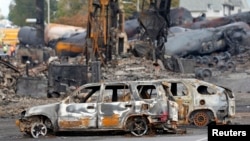The chief executive of the rail line whose runaway train derailed last week in a small Canadian town, causing deadly oil tanker explosions, says the engineer failed to properly set the brakes when he parked it as his work shift ended.
Edward Burkhardt of the Montreal, Maine & Atlantic Railway company visited Lac Megantic Wednesday and told reporters that the unnamed engineer has been suspended without pay. Burkhardt said the employee told company officials that he had applied 11 hand brakes on the tanker cars. The company chief said, however, that he no longer believes the engineer.
George Bibel, the author of the book, "Train Wreck: The Forensics of Rail Disasters," told VOA that setting the hand brakes is both time-consuming and essential.
"When they stop the train, they have to apply the air brakes. The air brakes will bleed off over a period of hours or longer and to mitigate that problem you also are supposed to apply hand brakes in numerous cars, which is a bit of an effort. They have to turn a wheel on every individual car. That’s pretty much the same as you had in the 19th century," he said.
Several oil tankers exploded in towering flames early Saturday after the speeding train derailed on a curve in the town, killing at least 15 people. Officials now say another 45 are reported missing, 10 more than previously thought.
Canadian police say they are looking at criminal negligence as a probable cause of the explosions. Burkhardt, seeing the disaster site for the first time, said it was "absolutely terrible" and looked "like a war zone."
An inspector said late Tuesday police are investigating how the parked train suddenly started rolling toward Lac Megantic.
Investigators say an earlier fire on one of the train's locomotives is the "focal point" of the investigation. The fire, quickly doused by firefighters, occurred after the engineer parked the train late Friday outside Lac Megantic.
Burkhardt earlier said the firefighters had shut down the first locomotive's engines, releasing its brakes, leading to the disaster. But on his visit to Lac Megantic, he blamed the engineer.
Canadian transportation safety official Donald Ross said the train, on a downhill run, was traveling at excessive speed by the time it reached the town.
"The train rolled down the approximately 1.2 percent grade. There's varying descending grades on the route, but it's all descending from the location where the train was left to Lac-Megantic. The train derails at approximately 0114 and although we can't provide the precise speed at the time, the train was traveling well in excess of its authorized speed at that point. The locomotive detached from the rest of the train and carried through the town and out the other side approximately 6/10 of a mile," he said.
Authorities have started to allow residents near the site of the explosions to return to their homes.





